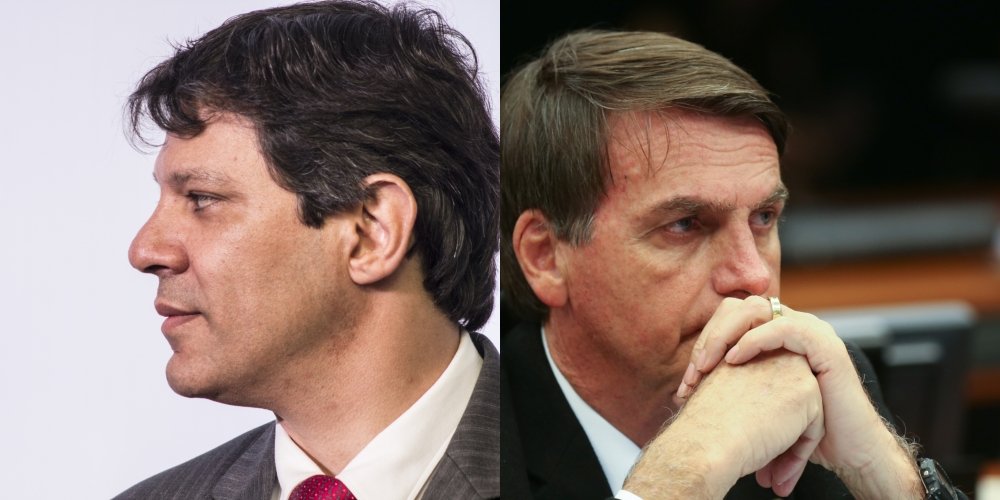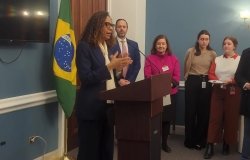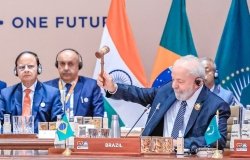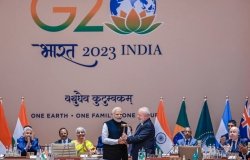
A blog of the Brazil Institute
An Unpredictable Presidential Showdown in Brazil
Right-winger Jair Bolsonaro and leftist Fernando Haddad are headed into an unpredictable showdown in a political atmosphere poisoned by intolerance and violence. Brazilian voters are bound to pick the candidate they see as the lesser of two evils on October 28.

Right-winger Jair Bolsonaro and leftist Fernando Haddad are headed into an unpredictable showdown in a political atmosphere poisoned by intolerance and violence. With neither candidate offering a convincing platform, Brazilian voters are bound to pick the president they see as the lesser of two evils.
Hard right populist Jair Bolsonaro, a former army captain with little to show for his 27 years in Congress, and Fernando Haddad, a leftist former university professor who lost reelection as mayor of São Paulo, Brazil’s largest city, just two years ago, will advance to the second and final round of a presidential race that has polarized the country and soured the national mood. The campaign has divided family and friends and has introduced a level of open political intolerance not seen for decades.
Although at one point it seemed Bolsonaro might win the race outright, the congressman ended up narrowly missing the 50 percent required and finishing the night at 46 percent of the vote against Haddad’s 29 percent. To win the runoff on October 28th, they will need to win support from the sympathizers of other presidential candidates, including those of two former state governors, Ciro Gomes and Geraldo Alckmin, who finished the night well behind the frontrunners at 13 percent and 5 percent, respectively.
The most recent Datafolha poll conducted before the election showed Bolsonaro with a sight edge in a runoff, and Sunday's results show Bolsonaro could indeed win. The poll also showed the two candidates tied in terms of their rejection rates of nearly 50 percent—higher than their approval figures. This number highlights voters’ main motivation in this strange election: Brazilians are not picking the candidate they believe to be the most qualified to govern the world’s ninth largest economy. Indeed, the 45-day official campaign which ended on Saturday offered little information to voters in terms of substantive proposals and debate on how the candidates would confront the country’s mounting economic and political problems. Rather, 140 million Brazilians went to the polls to vote for the candidate they see as having the best chance of preventing the victory the one they find most objectionable.
For those inclined to support Bolsonaro, the enemy is not Haddad, but his political mentor, former President Luiz Inácio Lula da Silva, a once wildly popular leader who is serving a twelve-year prison sentence for corruption and whose Workers’ Party led the impressive ascension and abysmal fall of the Brazilian economy and the country’s prestige in the world. For Haddad’s sympathizers, the former mayor—a political moderate in his own party—is the only person capable of preventing the presidency of a man famous for being an apologist of torture, rape, and racism. Complicating matters, both candidates have failed to reassure regarding their commitment to democracy and the rule of law.
A Trump-like politician (minus the U.S. president’s business experience), Bolsonaro has acknowledged that he “knows nothing” about the Brazilian economy. His main economic adviser, Chicago University trained economist Paulo Guedes, is an open critic of Brazil’s statist economic policies, which have been a major obstacle to the country’s competitiveness and integration in the global economy. The prominent role of Guedes in the campaign has helped Bolsonaro gain ample support in the business community. But Guedes has never before worked in government and will face stiff resistance from the retired nationalist generals likely to be recruited to occupy key cabinet positions in a Bolsonaro administration. He may also face resistance from his boss. During his quarter-century in Congress, Bolsonaro voted against all proposals to liberalize the economy and opposed the 1994 “Real Plan” that successfully stabilized the Brazilian economy. This suggests that a Guedes tenure as finance minister could be short. Moreover, Bolsonaro’s posture as a “law and order” candidate who will fight crime with repressive methods has not been translated into concrete proposals and could lead to an increase, rather than a decrease of violence. His stance against the LGBTQ+ community and his sexist and racist statements—two years ago told a congresswoman during a plenary that he would not rape her because “ you don’t deserve it”—is bound to create more friction in a society known for its ingrained machismo. It remains to be seen if Bolsonaro’s renewed presence on the campaign trail—the candidate was forced to stop campaigning personally after being stabbed and critically injured at a campaign rally on September 6th in the state of Minas Gerais —will help his cause or scare voters away.
Haddad faces the almost impossible task of convincing voters that he is not Lula and would act independently of his party if elected. His refusal to disavow the more extreme elements in the Workers’ Party platform—including a proposal for “social controls of media”—and promises to reverse liberalizing economic policies adopted after the impeachment of president Dilma Rousseff in 2016—such as the oil and gas tenders that have raised much-needed cash for the Brazilian government—have not reassured centrist voters or investors.
Electing a leader because he is the lesser of two evils is not the ideal way of choosing a president. But this polarized, toxic political environment has been evident in Brazil for months—even before the brutal September 6th stabbing of Bolsonaro introduced violence into national politics.
Yet political polarization is not sufficient to explain the precarious juncture at which Brazil finds itself in 2018, barely a decade after flying high on in the world stage as an emerging power headed to economic success and international influence. Polls show little evidence of polarization in the gubernatorial and congressional races which also took place on Sunday: despite the uncertainty and extremes of the presidential campaign, the other elections on Sunday seemed headed toward more traditional outcomes.
Sensing the exhaustion of Brazil’s political system, political elites (including those on the left), have acted to preserve and prolong the existing structure as a vehicle to preserve their access to budgets, government contacts, and patronage job in the public sector. “The good news,” Deputy Finance Minister Ana Paula Vescovi said recently, “is that the government has ran out of money.” She meant that, giving the rapidly disappearing room to keep the government afloat and in operation, the next president will have to face reality and build support in Congress to approve and implement unpopular decisions, such as the reform of the failing social security system, or face with the consequences of inaction: economic decline and the return of high inflation.
Earlier this week, the Ministry of Planning issued a report listing 36 measures the new administration will have to adopt or convince Congress to approve in its first 100 days. With the runoff just three weeks away, Brazil is running out of time decide its future.
About the Author


Brazil Institute
The Brazil Institute—the only country-specific policy institution focused on Brazil in Washington—works to foster understanding of Brazil’s complex reality and to support more consequential relations between Brazilian and US institutions in all sectors. The Brazil Institute plays this role by producing independent research and programs that bridge the gap between scholarship and policy, and by serving as a crossroads for leading policymakers, scholars and private sector representatives who are committed to addressing Brazil’s challenges and opportunities. Read more









